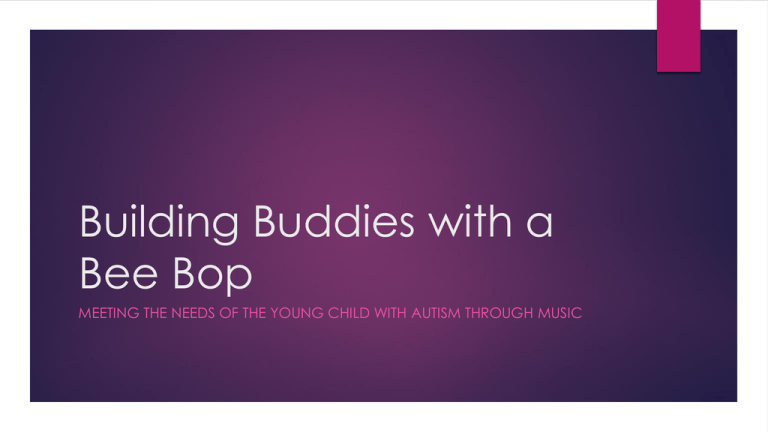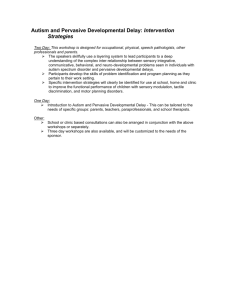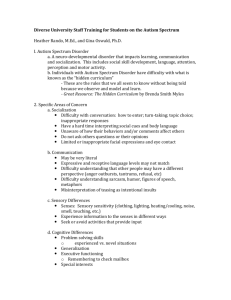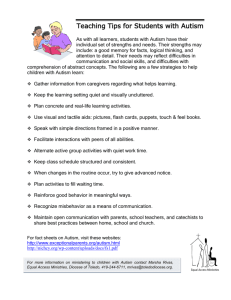Building Buddies with a Bee Bop
advertisement

Building Buddies with a Bee Bop MEETING THE NEEDS OF THE YOUNG CHILD WITH AUTISM THROUGH MUSIC What is Autism Spectrum Disorder? As defined by Autism Speaks, Autism spectrum disorder (ASD) and autism are both general terms for a group of complex disorders of brain development. These disorders are characterized, in varying degrees, by difficulties in social interaction, verbal and nonverbal communication and repetitive behaviors. What does that mean for music teachers working in the classroom? Music & Autism Research Music & Autism research show evidence supporting the clinical benefits of music therapy in the areas: Social Emotional Speech Communication Reduced anxiety Increased interaction with peers Assist in the learning of daily routines What is Music Therapy? Music Therapy is the clinical and evidencebased use of music interventions to accomplish individualized goals within a therapeutic relationship by a credentialed professional who has completed an approved Music Therapy Program. (American Music Therapy Association definition, 2005) What do Music Therapists do? Certified music therapists determine and implement functional goals to help improve the quality of life of the individuals served. Improving gross & fine motor skills Increasing attention Improving verbal & nonverbal communication Improving cognitive function Increasing sensory capacity Special Populations The Expressive Arts department at the Ann Storck Center in Ft. Lauderdale, became the main focus program which won awards and gained local and national recognition. The program focused on developing technology, grants, & events to showcase the talents of individuals with disabilities from preschool to adult. Bee Bop Buddies Bee Bop Buddies began in1998 for early intervention programs around South Florida. The company serves area preschools and offers sensory friendly musical events & programs for young children. Using a hands on approach to teach music to preschoolers also works well with young children with autism. A personal connection Matthew was diagnosed with PDD-NOS at the age of 3. He displayed sensory and communication needs. Music helped his speech, dancing helped his sensory needs, and music in the classroom encouraged his social skills. Music & Expression Encourage vocalization through familiar songs. Using hand over hand assistance, singing familiar songs and using a mirror encourages students to imitate sounds and vocalize familiar lyrics. Who are your students? Learn about the individuals attending your class Review student’s IEP Create ways to adapt testing and assessment material Use accommodations for the student to participate Talk with teachers, staff, paraprofessionals, & parents Adapt individual communication methods by adding pictures or signs Class Goals When working with a classroom that may include some students with Autism, the IEP goals maybe included with your learning goals. Socialization with peers Making Transitions from one activity to another Following directions Expression of emotions Increase fine and gross motor coordination Working in the Classroom Working in a classroom setting with some individuals who have sensory, behavior & learning concerns consider setting up the music classroom to adapt to students with special needs Use lots of visuals Create Picture Schedules Use social stories for the student before class Encourage routines Put in place a Buddy system Setting up the Class Consider environmental surroundings make adjustments to classroom Make the classroom sensory friendly Dim the lights if possible, reduce extra noises and sounds Reduce clutter and use picture labels on storage Safety first, use stop signs or do not put large music equipment by the door Use rugs, colorful squares or color tape to define a space Place your students away from distractions Preparing the Lessons Use a simple daily themes Music Mondays: New songs, music history, theory Techno Tuesdays: Using the keyboards & technology Wacky Wednesday: Learning rhythms, creating instruments projects Center Time Thursday: Using different center stations Or Weekly Themes Use each week in the month as a different activity theme The last week of the month create a Pick your Performance day Teaching the Lesson Keep it simple Give direct instructions Have a visual schedule with pictures or describing what to expect next Leave extra time to allow students to process each part of the lesson For upcoming performances always review the date, time & location daily During rehearsals, allow students to move around or take a break Use musical rewards or motivation to increase vocalization & participation Reward students who demonstrate simple good behavior and have them earn points towards a final reward The Lesson Structure Use a bell curve to create the lesson: Hello song to welcome class and to introduce theme Warm ups routine & movement songs Movement or hands on creative activity to reinforce idea Regroup and review the activity Bring the group back to calm everyone down Yoga exercise or quiet music Talk about theme and review Good bye song The Animals at the Farm 1. Hello Everybody! 2. Head Shoulders Knees & Toes (active warm up song) 3. Pass out Animal Puppets & ask each student to identify sound 4. Old MacDonald Had a Farm 5. Have the “Buddy System” using 2 animals next to a student with disabilities who may require assistance 6. Talk about the animals going back to the barn to sleep and collect puppets (use as transition time) 7. The Moon Song (use a calming song or yoga animal movements) 8. Goodbye Song For more information www.beebopbuddies.com MATTIE.BEEBOPBUDDIES@GMAIL.COM MATTIE MINGST, CMT







